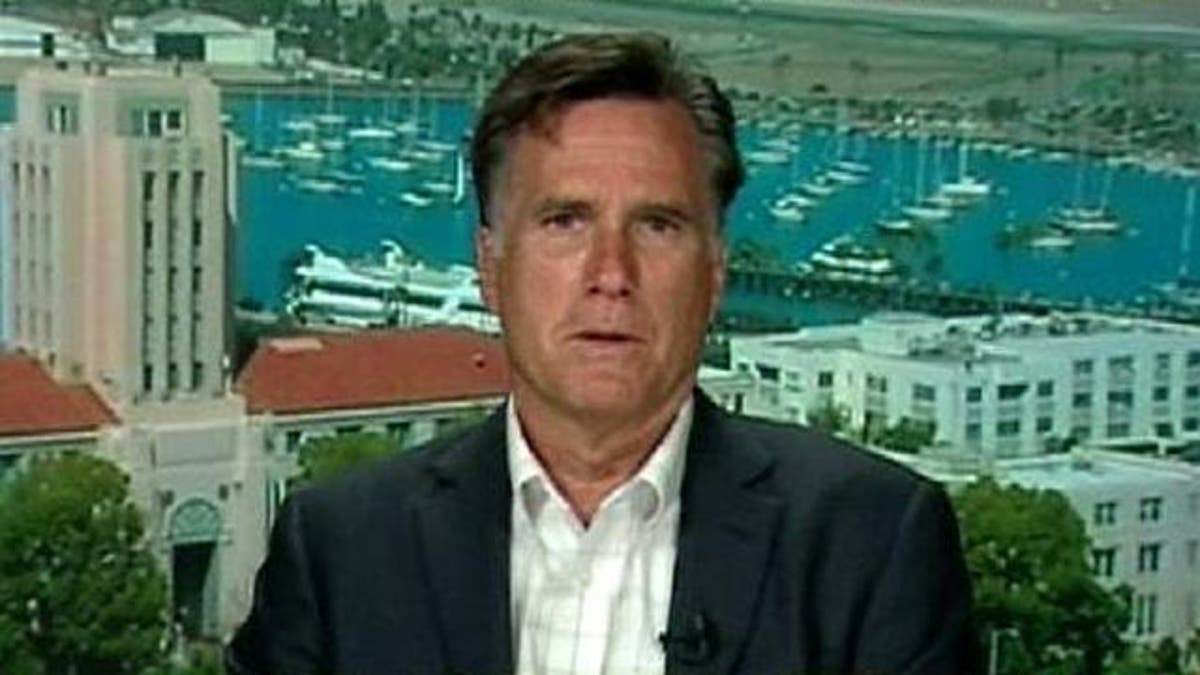
GOP presidential candidate Mitt Romney. (Fox Business Network)
Around the time that Mitt Romney started to double down on his immigration views, insisting that he would not support passage of the DREAM Act if elected president, news reports revealed that the former Massachusetts governor not only had familia in Mexico, but his dad--Michigan governor, 1968 Presidential candidate, and successful auto exec George Wilcken--was born south of the border. “¡El padre de Romney es de Mexico!,” exclaimed Fox News Latino senior columnist Geraldo Rivera (followed by: “Who knew?”).
Cyberspace was ablaze with chisme: Twitter Twin @MexicanMitt emerged, playing equally with stereotypes of Mexican-Americans (“I WAS BORN THIS GUEY”) as with those of preppy, wealthy North Easterners (“I AM THE JUAN PERCENT”). ¡Pssst! began the whispers that soon became a question asked out loud in columns, on Facebook, cable shows, and among friends: could Romney be the nation’s first Hispanic President?
Before you unequivocally and maybe indignantly answer, think about this: what does it mean to be Latino? Who is Hispanic?
While not new, this question is incredibly relevant, not only because of the Romney revelations, but because of the results of the 2010 U.S. Census which confirm the booming Latino community swelling to more than 50 million and making up 16 percent of the general population.
Before we start drawing lines around what and who is or is not Latino, let’s make sure that we don’t paint ourselves into a box that does little more than turn the focus away from the issues with most impact to our community.
“Diverse Diversity”
While painted with one brushstroke as “diverse,” this group is itself incredibly varied. We’ve heard a lot lately about the Cuban-Americans in Florida, especially now given the important Republican primary in the Sunshine State. The term Nuyorican reflects the unique and influential contributions of the Puerto Rican community to New York City where the largest concentration of boricuas outside the island have lived for decades. In the Southwest, some of my New Mexico friends proudly trace their heritage back generations to the Spanish land grants beginning in the 17th century. Cuban-Americans, Mexican-Americans, and “stateside” Puerto Ricans are the three pillars--of the U.S. Hispanic population. Add to this ajiaco (oops, just outed myself as being of Colombian descent): Dominicans, Argentineans, and Brazilians--to name a few of the twenty Latin American nationalities in the U.S.
What is the LEAST Latino State in the Union
Pretty Young Things
Then there’s perhaps the most crucial nugget of the data-rich Census: Latinos make up 23 percent of the under 18 population--a trend that’s growing. Who are they? Mainly U.S. born, plus increasingly like my nieces, the children of “mixed-marriages” or Hispanics marrying outside our ethnicity and culture, a trend that has increased dramatically since the 1960s. The “Millennial” generation is super-wired, and they see identity--race, ethnicity, language, sex--with a different set of boundaries, given that the accelerated advancements of technology have blurred the lines. Think about it: the “Millennials” start, develop, and end a relationship on text; they might not be so married to a restricted definition of who they are, or are supposed to be.
Which leads me back to Mitt Romney and his Mexican-born father. While some Latinos jokingly refer to him as Mitteo, others are genuinely offended that the man who campaigned in South Carolina with Kansas Secretary of State Kris Kobach--one of the architects of the nation’s tough immigration laws including Arizona’s SB1070--is even being considered the first Hispanic President (To be clear, Romney has made no such claim).
The Latino Identity Stress Test
This is where the slope starts to get slippery: Is former New Mexico governor Bill Richardson not Latino enough because at first blush his last name groups him with his Yankee and not his Mexican side? Should someone with stereotypical Hispanic looks (brown hair, eyes, and indigenous features and skin color) but who speaks a “gringo” Spanish turn in her “Hispanic credentials”? Is someone who errs from the political orthodoxy that Latinos are liberal and vote Democrat , a “sell out” such as Republican New Mexico Governor Susana Martínez or GOP Florida junior Senator Marco Rubio?
These uncomfortable questions cut to the deep impact the dramatic demographic changes are not just having on our country, but on our community. Geography, culture, relationships, immigration, migration, and technology are breaking open the meaning and the state of “being latino.” Hispanics, are becoming even more diverse than we are and have always been. Even though people throughout the ages have tried to preserve what they define as the “essence” of an identity, by nature, we are dynamic, as are language and culture--the vehicles by which we express ourselves.
The Rise of the Latino Super-PAC
Mitt Romney will need a lot of immersion to exorcise the gringo out of his castellano as heard when he speaks Spanish at the end of his ads. I also don’t see him any time soon trading in his pressed Brooks Brothers dress shirt for a guayabera like my dad who has one in every color. But before we start drawing lines around what and who is or is not Latino, let’s make sure that we don’t paint ourselves into a box that does little more than turn the focus away from the issues with most impact to our community. In my view, the first Latino President will be the leader who can put Hispanic, and thoroughly American issues such as the economy, jobs, education, and immigration ahead of Washington--or identity politics.
Viviana Hurtado’s blog The Wise Latina Club has won "Best Politics Blogger" awards by LATISM and Blogs by Latinas. She is a regular columnist for Fox News Latino. You can follow her on twitter at: @vivianahurtado
Follow us on twitter.com/foxnewslatino
Like us at facebook.com/foxnewslatino




